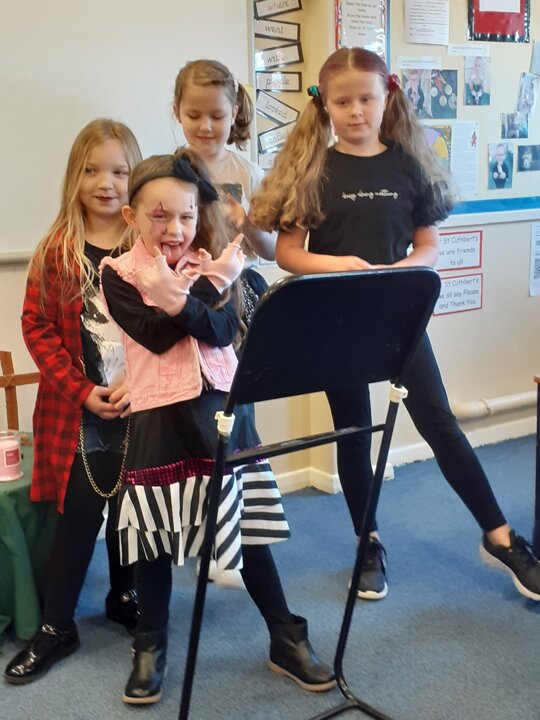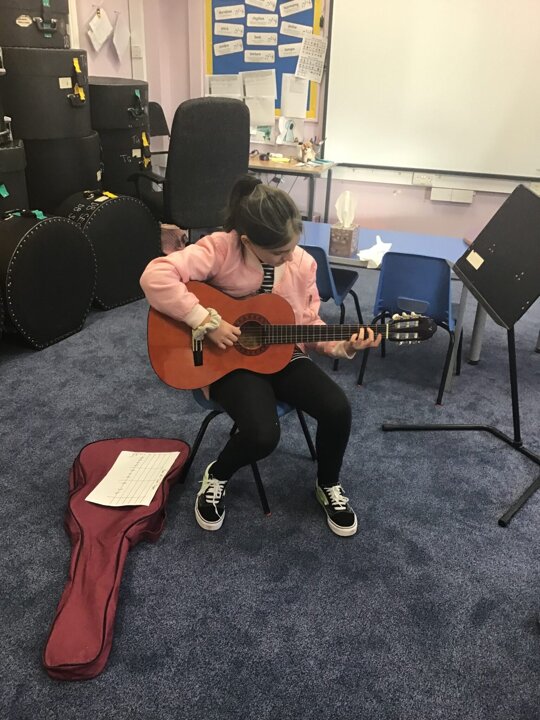Subject Lead: Miss Grylls
Aims and objectives
Music is a unique way of communicating that can inspire and motivate children. It is a vehicle for personal expression, and it can play an important role in the personal development of people. Music reflects the culture and society we live in, and so the teaching and learning of music enables children to better understand the world they live in. Besides being a creative and enjoyable activity, music can also be a highly academic and demanding subject. It also plays an important part in helping children feel part of a community. We provide opportunities for all children to create, play, perform and enjoy music, to develop the skills, to appreciate a wide variety of musical forms, and to begin to make judgements about the quality of music.
The three main aspects of teaching music in our school are:
- Listening and appraising
- Composition
- Performance
Teaching and learning style
At St Cuthbert’s Primary School, we seek to make music an engaging, active, enjoyable learning experience for all children. We encourage children to participate in a variety of musical experiences through which we aim to build up the confidence of all children.
Singing lies at the heart of good music teaching, together with learning to play tuned and untuned percussion instruments. Our teaching focuses on developing the children’s ability to sing in tune and play percussion instruments with other people. Through singing songs and playing rhythms and tunes, children learn about the structure and organisation of music. We teach them to listen to and appreciate different forms of music. As children get older, we expect them to maintain their concentration for longer, and to listen to more extended pieces of music. Children develop descriptive skills in music lessons when learning about how music can represent themes, places, feelings and emotions. We teach children to make music together, to understand musical notation, and to compose pieces. When possible, whole class instrument lessons are delivered by members of staff aspart of the music curriculum. This may be recorders, or tuned percussion such as chime bars.
Additional music teaching
Children are offered the opportunity to study a musical instrument with peripatetic teachers. Peripatetic music teaching is provided by The English Martyrs School and Tees Valley Music Services. Parents who want their children to participate in the scheme must purchase or hire the instrument and pay the additional music lesson fees on a termly basis. These lessons are normally taught to small groups of children who have chosen to learn one of a variety of instruments, such as the guitar or a brass instrument. This is in addition to the normal music teaching of the school, but usually takes place during curriculum time.
Music curriculum planning
Our school uses the national curriculum for music as the basis for its curriculum planning. While there are opportunities for children of all abilities to develop their skills and knowledge in each teaching unit, the progression planned into the scheme of work means that the children are increasingly challenged as they move through the school. We have access to Charanga, a music resource that supplements music lessons within the curriculum and CPD online training is available to support the teaching of music from TVSM linked to the scheme.
The Early Years Foundation Stage
We teach music in nursery /reception classes as an integral part of the topic work covered during the year. The musical aspects of the children’s work relate to the objectives set out in the Early Learning Goals which underpin the curriculum planning for children aged three to five. Music contributes to a child’s personal and social development. Counting songs foster a child’s mathematical ability, and songs from different cultures increase a child’s knowledge and understanding of the world.
Assessment for learning
Children demonstrate their ability in music in a variety of different ways. Teachers will assess children’s work in music by making informal judgements as they observe them during lessons. On completion of a piece of work, the teacher assesses the work and gives oral or written feedback as necessary to inform future progress. Older pupils are encouraged to make judgements about how they can improve their own work.
The school choir and musical events
We believe that music enriches the lives of people, and so we wish to involve as many children as possible in musical activities. We have an inclusive school choir which we encourage children from Y3-6 to join. The choir enables children to enjoy singing together, broadens their musical experience and provides the opportunity to perform both in and outside of school.
We provide opportunities for budding musicians to perform for the school community.
This includes solo and ensemble performances as part of assemblies, seasonal events and concerts. This recognises their achievements and celebrates their success.



